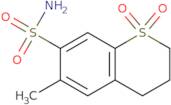Meticrane
CAS : 1084-65-7
Ref. 3D-BAA08465
| 1g | Arrêté | ||
| 5g | Arrêté | ||
| 10g | Arrêté | ||
| 1mg | Arrêté | ||
| 10mg | Arrêté | ||
| 250mg | Arrêté | ||
| 500mg | Arrêté |
Informations sur le produit
- 2H-1-Benzothiopyran-7-sulfonamide, 3,4-dihydro-6-methyl-, 1,1-dioxide
- 2H-1-Benzothiopyran-7-sulfonamide, 3,4-dihydro-6-methyl-, 1,1-dioxide (9CI)
- 6-Methyl-3,4-dihydro-2H-1-benzothiopyran-7-sulfonamide 1,1-dioxide
- 6-Methyl-7-sulfamide-thiochromane 1,1-dioxode
- 6-Methyl-7-sulfamido-thiochroman-1,1-dioxide
- 6-Methyl-7-sulfamoylthiochroman 1,1-dioxide
- 6-Methylthiochroman-7-sulfonamide 1,1-dioxide
- 6-methyl-3,4-dihydro-2H-thiochromene-7-sulfonamide 1,1-dioxide
- Arresten
- E 103E
- Voir d'autres synonymes
- E-103-E
- Fontilix
- Fontiliz
- Meticran
- Meticrane [INN:DCF:JAN]
- Meticrano
- Meticrano [INN-Spanish]
- Meticranum
- Meticranum [INN-Latin]
- Sd 171-02
- Sd 17102
- Thiochroman-7-sulfonamide, 6-methyl-, 1,1-dioxide
- Unii-I7Ekn1924Q
- Meticrane
Meticrane is a protein that is the product of gene transcription and translation. It has been shown to be expressed in cardiac tissue and cancer tissues, as well as in cells from the liver. Meticrane is also found in bacteria, which may be responsible for its antiangiogenic properties. The biological function of this protein is not yet known, but it has been shown to have cell-specific expression and can bind to bacterial 16S ribosomal RNA. It has been found that Meticrane inhibits polymerase chain reaction (PCR) amplification of bacterial DNA by binding to the primers and blocking their interaction with the template DNA strand.
Meticrane
br>A protein gene that is the product of gene transcription and translation; expressed in cardiac tissue and cancer tissues, as well as in cells from the liver; found in bacteria, which may be responsible for its antiangiogenic properties; biological function unknown; binds to bacterial 16S ribosomal RNA





